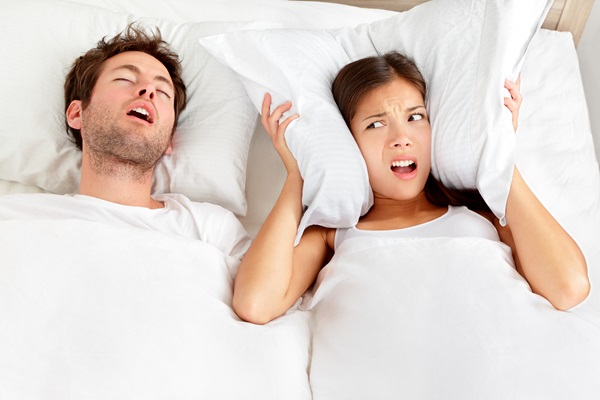Dental Oral Appliance Therapy for Obstructive Sleep Apnea

Oral appliance therapy is ideal for people with mild to moderate obstructive sleep apnea (OSA). This dental device keeps the airway open during slumber at night. It prevents sudden and short breathing cessation that lasts for 1-2 seconds or longer. Severe cases can cause serious health issues such as hypertension, heart attack, and stroke. Keep reading to find out more about oral appliance therapy and how it can help you.
Obstructive sleep apnea explained
Obstructive sleep apnea happens when there is a partial or complete blockage in the airway. During an OSA episode, the soft tissue of the rear section of the throat collapses. This triggers the muscles of the chest and diaphragm to work harder and increase the pressure to open the airway. Usually, when the breathing resumes, it comes with a sudden body jerk or a loud gasp. This sleep disorder can affect men and women, young and adults.
Causes and risk factors
Many conditions and physical events may cause obstructive sleep apnea. Studies show that most people are not aware of these causes. This only worsens the apnea. That is why consulting a sleep doctor is necessary. Below are the known causes of obstructive sleep apnea:
- Polycystic ovary, hypothyroidism, and other endocrine conditions
- Asthma, pulmonary fibrosis, and other chronic lung diseases
- Obesity hypoventilation syndrome
- Pregnancy
- Neuromuscular conditions like stroke
- Kidney or heart failure
Some physical traits can increase one’s risk for this type of sleep apnea. The narrowing of the upper air passages can result in or even aggravate it. Large tonsils and obesity can almost close up the throat. Collar sizes of at least 16 inches in women and 17 inches in men are also risk factors. Smoking and a family history of this sleep apnea can increase the person’s risk of the sleep disorder.
Symptoms of obstructive sleep apnea
Oftentimes, the patients are not aware that they have OSA. Their bed partners are the ones who discover or suspect the troubling condition. Common symptoms are loud snoring, sleeping problems, night sweating, sore throat, daytime fatigue, and intellectual impairment. The clinical and physical features that OSA patients share include a large neck, obesity, and nasal obstruction.
What obstructive sleep apnea does to the body
Sleep apnea involves the blockage of the airway during nighttime sleep. The pause in breathing signals the brain to start breathing again. This produces a loud snore. The event often causes sleep interruption.
High blood pressure, obesity, and other health conditions are often associated with apnea. These can harm the body. When breathing stops, the body stops getting oxygen. This can worsen COPD (chronic obstructive pulmonary disease) and asthma. The individual may experience shortness of breath.
Sleep apnea can also lead to insulin resistance. This disables the ability of the cells to take in insulin. The condition makes the blood sugar levels rise, which then leads to the onset of Type II diabetes. Apnea is also linked to high bad cholesterol, liver scarring, and fatty liver disease. An individual may also develop abnormal heart rhythms. Apnea can also cause tingling and numbness in the extremities.
If diagnosed with obstructive sleep apnea (OSA)
For proper diagnosis, it is important to visit a board-certified sleep medicine dentist. The dentist will check the symptoms like family history, smoking habits, and underlying medical conditions. They will perform a physical examination to check any issues in the patient’s mouth, nose, and back of the throat. The dentist will also measure the neck and waist circumference. The unusual enlargement of these body parts is a sign of obstructive sleep apnea. If the results show that the patient has OSA, the dentist will recommend treatment options that include oral appliance therapy.
Get familiar with oral appliance therapy
Oral appliance therapy uses the dental or mandibular advancement device. It pulls or pushes the lower jaw forward to keep the tongue from blocking the air passage. This customized treatment device is lightweight and portable. It makes it easy for people to take it along during travel. Since the device goes in the mouth, the patient can sleep on their side or stomach. The appliance does not need electricity to function well.
Sleep without fear or disturbance: oral appliance therapy works
Oral appliance therapy keeps obstructive sleep apnea at bay. It lets you face the day with more energy. Using it on a regular basis helps you reduce the risks associated with this sleep disorder. But, you still need professional advice before using this type of treatment.
This will ensure proper solution and therapy for your specific condition. In addition, you have to act on it as soon as possible. Visit your dentist today and get your symptoms evaluated for obstructive sleep apnea. Then, you can enjoy a great night’s sleep again.
Are you considering oral appliance therapy in the Miami area? Get more information at https://www.southfloridadentalarts.com.
Check out what others are saying about our dental services on Yelp: Do I Have Sleep Apnea in Miami, FL.
Recent Posts
Sleep apnea is a serious sleep disorder that affects millions of individuals worldwide. It occurs when breathing repeatedly stops and starts during sleep, disrupting rest and potentially causing long-term health consequences. Many people are unaware that a general dentist plays a key role in diagnosing and managing sleep apnea, particularly with non-invasive treatment solutions. By…
Dental sleep medicine treatment focuses on treating sleep apnea and other related conditions. More dentists are choosing to practice in this line of work because there are actually a lot of good dental sleep apnea treatments available to patients. Modern-day dentistry has evolved quite a bit, which has allowed for the evaluation of all kinds…
Are you looking for CPAP alternatives to treat your sleep apnea? Obstructive sleep apnea is a common condition that impacts millions of individuals all across the globe. Due to this condition, the patient’s airway closes while they are asleep. This can lead to symptoms like difficulty staying asleep throughout the night, snoring, morning headaches, and…
Seeking treatment for sleep apnea is important for your general health. Your general dentist can detect signs of this sleep disorder during a comprehensive dental exam. The sleep doctor can work with your dentist to correct the problem. Here are the details about when to see a dentist for sleep apnea.This sleep disorder makes a…


